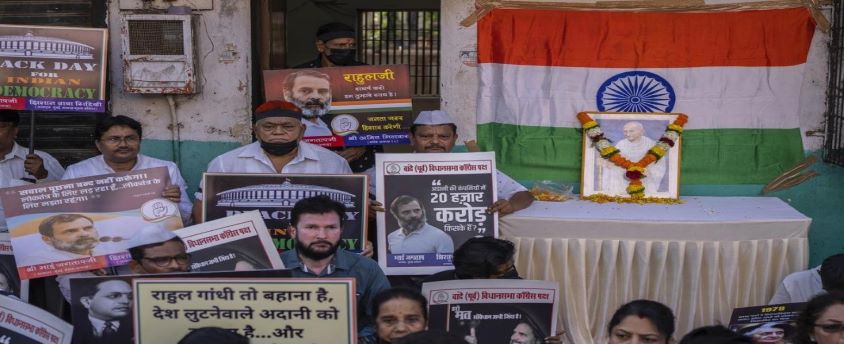The disqualification conundrum
03, Apr 2023

Prelims level : Polity
Mains level : GS-II Polity - Parliament - structure, functioning, conduct of business, powers & privileges and issues arising out of these.
Why in News?
- The disqualification of Rahul Gandhi from his membership of the Lok Sabha has brought back discussions as to whether the earlier protection enjoyed by serving legislators from immediate disqualification must be restored.
Past protection:
- Section 8(4) of the Representation of the People Act (RPA), 1951, allowed convicted MPs, MLAs and MLCs to continue in their posts, provided they appealed against their conviction/sentence in higher courts within three months of the date of judgment by the trial court.
- However, in 2013, the Supreme Court through its landmark judgment in the Lily Thomas v/s Union of India case, struck down Section 8(4) of the RPA, 1951.
- The Section was declared unconstitutional by the apex court on the ground that the Parliament did not have the required legislative competence to enact such legislation.
- According to the Supreme Court, Article 102 of the Constitution had mandated Parliament to enact a common law prescribing terms and conditions to disqualify an individual for both “being chosen as” as well as “being a member” of Parliament (Article 191 is the corresponding article for State Assembly and Legislative Council).
- However, as per Sub-section (4) of Section 8 of RPA the mere act of filing an appeal would operate as a stay on disqualification until its disposal.
- The apex court had ruled that by creating one provision for the immediate disqualification of ordinary citizens and another one for deferred disqualification of legislators, Parliament had violated the constitutional mandate.
What was the government’s stand?
- The then government had tried to defend the protection clause for sitting members with two arguments:
- The government had argued that such a clause would become crucial if in case a regime has a wafer-thin majority, and an immediate disqualification of a member or two from the date of conviction may result in a loss of majority and a change of regime.
- The government had also argued by saying that immediate disqualification would require the conduct of a by-election and if in case the conviction is dismissed by an appellate court after the by-election’s outcome, then the result cannot be reversed, and the exonerated former member cannot be restored as a member.
- The government further said that the Parliament was not making two different provisions for governing disqualification, as the protection clause only postpones the time of disqualification which does not mean that members were subjected to a different kind of treatment.
- The Supreme Court however rejected these arguments and held that a member facing immediate disqualification could only file an appeal and seek a stay on the conviction.
- The court also clarified that the disqualification will cease to operate from the “date of stay” of conviction by an appellate court.
The relevancy of the date of stay:
- The “date of stay” of conviction has also given rise to various questions.
- In most of the cases, there has been no stay on conviction, as the Supreme Court has often said that only suspension of sentence, grant of bail and pending appeals are to be treated as normal remedies, and stay of conviction should be given only rarely.
- Various examples of leaders who had lost their membership and later went on to either succeed or lose in their appeal have not created any major controversies.
- However, a Lakshadweep MP who was convicted and sentenced to a 10-year prison term in January 2023 managed to get a stay of conviction from the Kerala High Court, but by then, his seat was declared vacant by the Lok Sabha secretariat and a date was also fixed by the EC for the byelection.
- The MP challenged this in the Supreme Court and the EC said it would honour the court’s stay order. However, the MP’s Lok Sabha membership is yet to be restored.
- The main reason for the delay in the restoration is that the date of conviction is when the disqualification comes into effect, but the stay of conviction starts only from the day the stay is granted, which means that during the intervening period, the member did suffer disqualification.
- Thus, there are questions such as can the membership be restored or restituted with retrospective effect from the date of conviction.
Recommendations:
- The Secretariat of the respective Houses must accept the order of stay on conviction and restore the membership without further ado until the appeal is complete.
- The secretariat must also be mandated to wait until the convicted members approach the appellate courts for a stay of conviction and notify a vacancy only if the application is dismissed.
- Further, the President or Governor should exercise their powers under Article 103 and Article 192 (State Legislature) and formally declare a member to be disqualified instead of using the “automatic” disqualification route.






